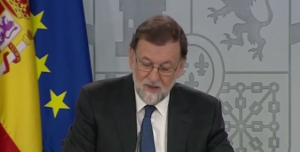SPAIN faces imminent elections after this week’s no-confidence motion rocked the Madrid establishment and dragged the eurozone into a fresh crisis – as Brussels was simultaneously coping with an new Italian government threatening to IGNORE EU rulings it doesn’t like, and of course Brexit.
Spain has joined Italy in becoming a huge political headache for the European Union, following a week of political turmoil in the country.
Earlier this week, Spain’s opposition socialist party filed a no-confidence motion against the prime minister, Mariano Rajoy, over an ongoing corruption scandal.
Pedro Sánchez, the leader of the socialists, said that the scandal had degraded Spain’s image before the European Union.
Following this decision, the Spanish stock index tumbled and the bond yield rose, adding to EU woes as similar economic uncertainty has unsettled Italian markets.
Defending the no-confidence motion, Mr Sánchez said the corruption case had “seriously damaged the health of our democracy”.
There is growing pressure on Mr Rajoy to call an early election, following a call from three of Spain’s four largest parties.
However, the Prime Minister has ruled out a snap election and warned that the political instability will wreak havoc on Spain’s fragile economic recovery.
Mr Rajoy, who heads a minority administration, called the challenge against him “nonsense” before reiterating his commitment to remaining in power until the end of his term in 2020.
He added that the strength of Spain’s response to the threat of Catalan secession was now also at risk.
He told reporters: “This motion is bad for Spain, bad for Spaniards, brings with it too much uncertainty and is damaging to all citizens.”
There are now mounting fears about political instability in Italy and Spain causing widespread chaos in the eurozone.
The uncertainty surrounding thecurrency’s two largest peripheral debt markets rocked European bank shares on Friday.
This also follows the expected decision in Italy to appoint a long-time Eurosceptic, Paolo Savona, as finance minister.
The spread of political instability has prompted investor sentiment to start to turn against the eurozone.
Mark Dowding, co-head of developed markets at investment group BlueBay Asset Management, said: “It’s easy to see how vulnerable heavily indebted countries can become if investor confidence is eroded.”
One chief executive of a large Spanish company told the FT: “There is still huge momentum in the Spanish economy — this kind of uncertainty is always damaging.”
Source: express
Ask me anything
Explore related questions





